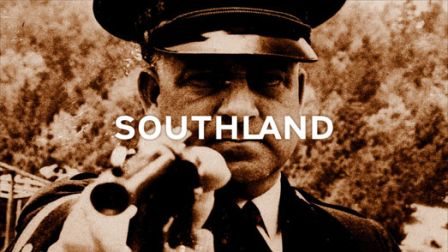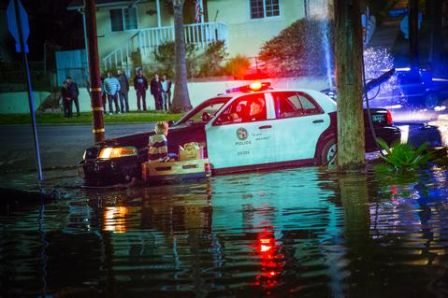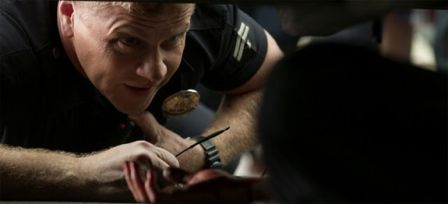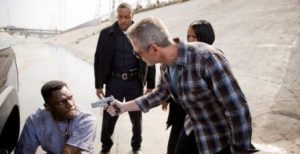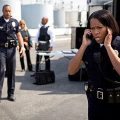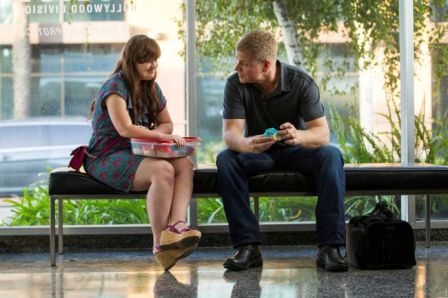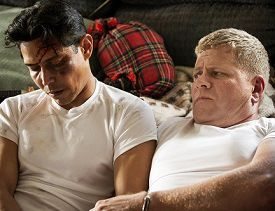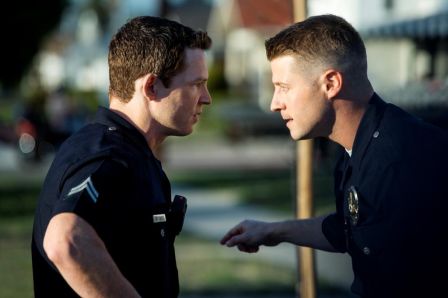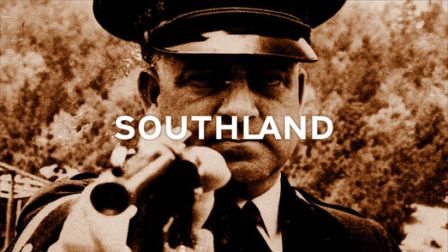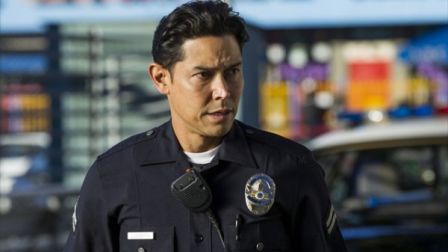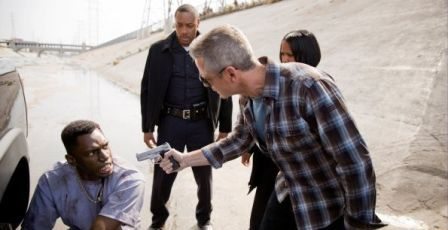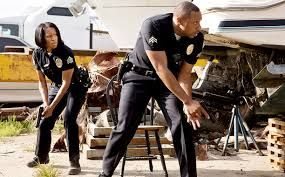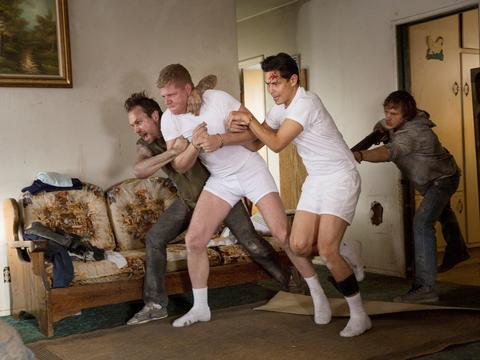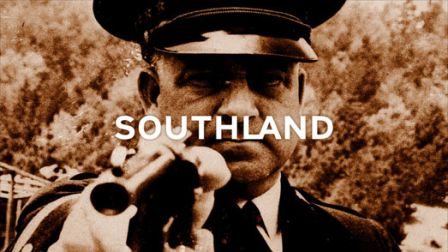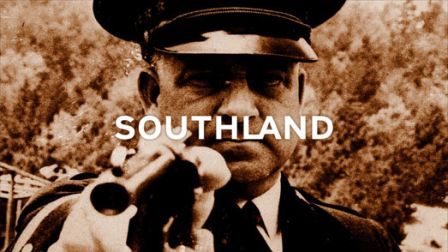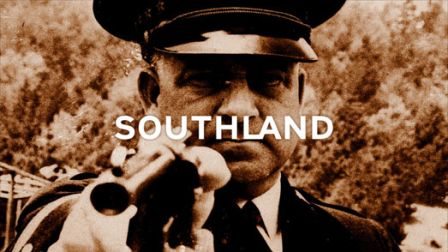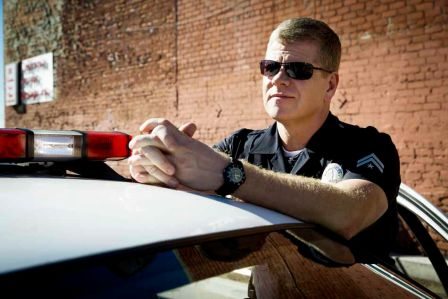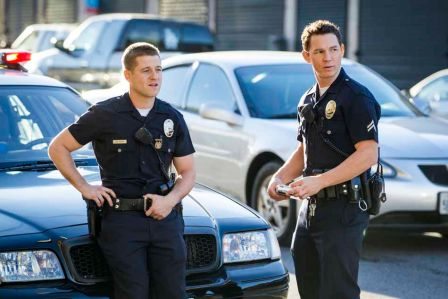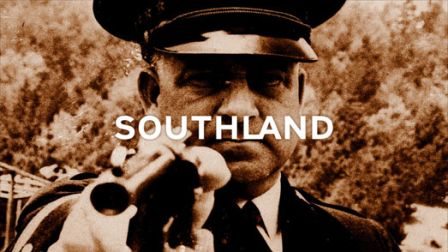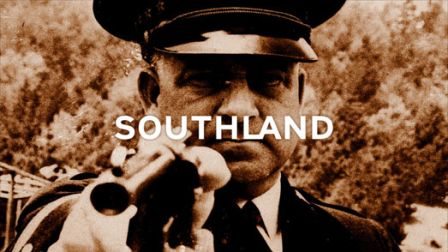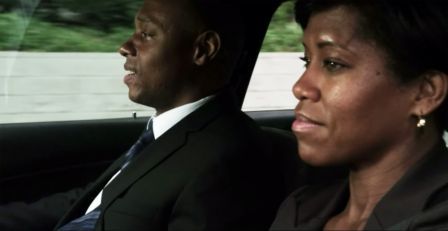The LAPD serves four million people speaking over one-hundred languages. Sometimes things get lost in translation.
The opening voice-over brought to mind the night I and my captain were riding together on patrol. He was a tough old bird. A relentless tobacco-chewer with the strength of three grown men and the heart of a dozen.
During his many years of service, the captain had risen through the ranks, seeing just about all there was to see in the cops and robbers world. He been shot at and he’d shot back. He’d gone toe-to-toe with the best of them. And he’d helped the worst of them when their days seemed the most bleak. But what he hadn’t seen coming, or so I thought, was an influx of Spanish-speaking newcomers to the area. I was sure he didn’t understand a word of the language. Not one. And I was curious to see how he’d handle a certain situation that developed the Friday night we conducted a traffic stop on an older model Cadillac. A totally tricked-out car filled to the brim with young Spanish-speaking men who’d “come to town” to whoop it up after a long, hot week of working in the tobacco fields.
The captain, as we saw last night on Southland, was driving, which made him “contact,” meaning it was he who was in charge of the stop, and it was he who would do the talking. I was to serve as his backup and a second set of eyes.
“Do you know why we stopped you?” said the captain, through a golf-ball-size wad of his favorite Levi Garrett “chew.”
The blue-silk-shirted driver remained silent. The mother of pearl buttons on his cowboy-style attire glistened each time our revolving red lights made a full rotation.
“I said, do you know why I stopped you?”
Again nothing from the driver, or from either of the six similarly-clad passengers.
“Have you been drinking?”
Silence.
“Step out of the car,” said the impatient captain, his voice growing louder with each word spoken.
No movement. Nothing. Just seven confused expressions.
“I guess you don’t speak English, right?
“Si. No habla ingles.”
The captain looked at me, then back at the driver.
“Well, let’s see if you habla this…”No getta outta the car-o, you ‘el going to ‘el hoose-gow. Capise?”
Well, it took precisely 20 seconds for all seven men to exit the car and line up beside it. The driver, the apparent “spokesperson” for the wanna-go-partying farmers promptly apologized, in English, explaining that until that moment, pretending to not speak English had saved them from scores of traffic citations. He said the plan also worked well as an ice-breaker with intoxicated women in nightclubs. He said they felt it was cute and sexy to help their new “hombre sexy” learn a few sweet words of English.
The captain shook his head from side to side and then walked back to our patrol car. A minute or two later he returned with a summons citing the driver for no brake lights and no turn signal.
After the man signed the summons and received his copy from the captain, the driver again apologized for the attempted ruse.
The captain’s lips split into a light smile. He said, “No hay problema. Tenga una buena noche. Y por favor, conduzca con precaución.”
He looked at me and calmly said, “My wife’s parents are from Mexico, so I learned a little Spanish to get me through holiday visits. I saw this guy in the grocery store last week, and his English was just fine when he was trying to get a date with the cashier.”
Anyway, language barriers can truly make a cop’s job quite difficult. All it would take is one misunderstood word or phrase, and lives could be lost in the midst of translation.
John Cooper, after last week’s fiasco with his “gun-shy” boot, has decided that his days as training officer (TO) are over. He’s had it. Finished. Exit stage left. So he’s given a new, seasoned partner, a veteran officer who doesn’t play the part of second fiddle that Coop’s so used having occupy the shotgun seat in his patrol car. It will take Cooper a while to adjust to not calling all the shots. And, believe me, it’s a hard habit to break, not telling your partner every move to make. However, by the end of the shift, Cooper was warming up a bit to the new partner. We’ll see how long that lasts. I’m guessing until the sergeant finds another warm body to plant in Coop’s passenger seat. Teaching new officers is Cooper’s thing. It’s what he does, and he does it well, with experience and “old guy” tough love.
Old Guy – An officer who’s been on the job long enough to see chiefs and sheriffs come and go, as well as boots who’ve made their way from rookie to stripes, stars, and bars on their collars. I realized I was an “old guy” when I saw the looks of disbelief on rookies’ faces when I talked about the days revolving red lights and revolvers.
– Ben and Sammy’s stint as puppeteers should be short-lived, especially Sammy’s. Scaring kids, I don’t think, is the object of the performance. Ben, on the other hand, seems to turn every event into an opportunity to put another notch on his bedpost, using his uniform as bait while he trolls the waters. Ben had better watch it, though, because those “fish” have been known known to bite cops on their butts, and I don’t mean affectionate love nibbles, either.
– The situation between Sammy and Tammi is a festering boil, ready to pop at the first bit of real pressure. Now Tammi’s filed an official complaint with the department, stating that Sammy assaulted her. Of course, we all know what happened. Unfortunately, we won’t be called as witnesses. Ben, however, will, and he’s already made it clear that he’ll “do what it takes” to help. Meaning, I’m sure, that he’ll lie for Sammy to help get him off the hook.
Remember, the part of the altercation that Ben saw came after Tammi struck Sammy. So, for all he knows, Sammy did assault her. It will be interesting to see which direction this goes, especially since I’m having a hard time figuring how well a red-headed kid plays in Sammy’s gene pool. Is the child really his? Who knows? I do know that this situation is becoming a bit tiresome for viewers. I’d love to see it come to some sort of conclusion so we all can move on. It’s beginning to wear on us like the Castle and Beckett “I love you, do you love me,” scenario that went on and on and on and on.
– We saw a female officer in foot pursuit of a thug they call “Roadrunner.” She was running, breathing hard, and trying to provide information to the dispatcher, all at the same time. Every officer can tell you what it’s like to hear that sort of traffic on the radio. The sentences are broken. The voice is high-pitched. Excited. And there may be a bit of fear mixed in. The sounds automatically send every officer within earshot into hyper-alert, hyper-adrenaline mode. They want in on the chase. They need to help their fellow officer. It’s what they do.
On the other hand, the pursuing officer is subject to a severe case of tunnel-vision, blocking out everything but the prey…the runner. So, yes, we do sometimes NOT notice holes in the ground, kid’s toys scattered about, tree roots, sleeping dogs, and yes, the proverbial clothesline. And, believe me, it happens. And it “ain’t” pretty when it does. Imagine hitting a piece of wire while running at full steam. Nope, not good. And, it could end a life. Tunnel-vision is a true enemy of law enforcement.
– Lydia… She and Ruben catch a murder case involving the shooting death of a young man who was supposedly killed over a drug debt. The victim came from a very nice family, it seemed, and a mother who cared deeply for her son. Unfortunately, this death would be the third son the mother had lost to street violence. And it made no difference to her why her son was killed. Didn’t matter. He was her son and she loved him.
I hear it all the time. “How can those two support their son, after all he’s done. You know killing that guy, and all.” Well, as parents, we’re not equipped with off and on switches to control our emotions and love for our children. We love them unconditionally. Doesn’t mean we don’t despise some of the things they do. But we still love them. Like Scott Peterson, the California man who was convicted of killing his wife and their unborn child. Peterson’s family have been at his side since the beginning, and I imagine they’ll remain there until, or if, the day comes when he faces his execution.
Cooper and Hank roll up on a group of men harassing what they believed to be a homeless guy. We saw Hank grab a guy and walk him to a wall where he patted him down, a search for weapons. Normally, the cops on this show conduct excellent pat-down searches, just like the best officers on the street. This time, the way Hank walked the guy back to the wall, was not good. He had no control over the suspect at all. I was actually surprised when I saw this, because it was so out of place for Southland, a show that gets even the tiniest detail right.
Cooper and Hank are driving along when Coop suddenly makes a U-turn and pulls up to a kid’s lemonade stand. I like the scenario because it showed how cops are ever-vigilant, with the entire day’s events flashing through their minds all the time. Cooper saw someone driving while holding a lime green cup, something he’d observed at other scenes throughout the day (the green cups) and had subconsciously filed away for later reference. Well, he saw the same cups at the lemonade stand, and…Bingo…he instantly connected the dots. The lemonade was causing all the weird behavior/hallucinations. A great scene.
– Hank’s statement, “I’m not brown, I’m blue,” was definitely a statement to note. Police officers come from all walks of life and all skin colors, but together they act as one…police blue.
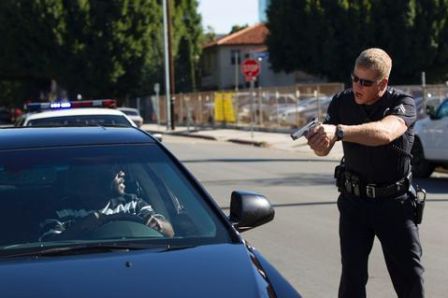
Coop and Hank’s traffic stop where Roadrunner reaches for something in the seat beside him, was nearly textbook perfect. From the way the officers zeroed in on the classic “oh s**t look on the driver’s face (meaning he was up to something no good, or had already done something and wanted to avoid the police) to directions given while having the man step out of the car. I think Michael Cudlitz should become a police academy instructor if he ever tires of acting. By the way, Michael, the invitation for you to come to the Writers’ Police Academy still stands. It’s hard to believe that we first spoke about it three seasons ago. Time sure flies when you’re playing cops and robbers, huh?
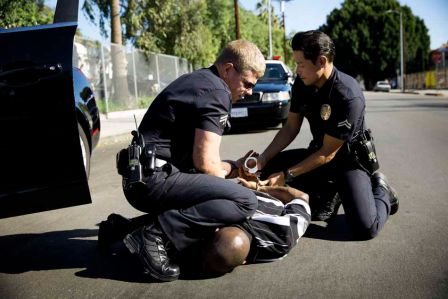
Okay, we’ve reached the point where Sammy and Ben enter a building, the scene of a “shots-fired” call. They heard gunfire and immediately went inside without waiting for back-up. This is the way it’s done for an active shooter scenario. No longer do cops wait outside until help arrives. The idea is to save as many lives as possible, and to do so immediately. All of you who attended the Writers’ Police Academy a couple of years ago saw an active shooter scenario unfold right before your eyes, and it was a real heart-thumping situation.
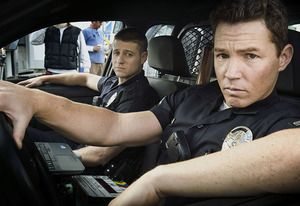
Sammy and Ben discover several wounded, or dead, civilians inside, and Ben is almost shot. Sammy fires at the suspect, but he gets away only to return later to shoot it out with police. This time, however, he’s met with a volley of gunfire from several officers, including Ben, who’s still in shock from his earlier encounter.
I’ve been in a few shooting situations, including one where I and a deputy sheriff answered a shots-fired call at a jam-packed nightclub. He’d called for backup but all other deputies were tied up on other calls. I was working an undercover drug operation in the city, so I stopped what I was doing and headed out to assist. When we pulled into the parking lot (separate vehicles) we immediately saw people running in all directions. We also heard the sound of fully automatic gunfire inside the building. We called for backup and then headed toward the building. We’d only gone a few steps when the shooter stepped outside and fired three or four bursts in our direction. We took cover behind one of the cars to give us time to regroup, swallow hard a couple of times, and devise a plan. Well, the only plan we could come up with was that we had a bad guy to arrest before he hurt someone else. Long story short, after dodging several more rounds, we were able to get the guy to surrender after much shouting on our part and shooting on his. Fortunately for us, the dummy was a really poor shot.
After all was said and done that night, I realized that my hearing must have chickened out and remained behind the car at the precise moment of our charge toward the shooter. I say so, because I still don’t recall hearing a single sound until I placed my cuffs around the man’s wrists. That ratcheting sound, however, seemed as loud as a bowling ball rolling down a set of wooden steps. And, I believe, that was what Ben was experiencing after the shotgun blast most likely burst his eardrum. The mixture of fear and adrenaline definitely slows time and dulls the hearing. What it doesn’t do, however, is improve marksmanship or reflexes, which explains the high number of rounds fired by police at some shooting scenes.
And, finally, we end with Lydia snapping a photo of her holding the baby. Does her smile indicate that she’s going to overcome the difficulties she’s been experiencing as a new mother? Did the woman who lost three sons to street violence have a life-changing impact on her? Maybe so.
Oh, yeah, let’s not forget Dewey, who was classic Dewey…obnoxious, rude, and insensitive. And the citizens of L.A. let him know it by tagging his patrol car and flattening the tires. When officers treat people with respect they normally receive respect in return. Believe me, folks. This is true in real life. C. Thomas does a great job in this role of portraying “how not” to behave as a police officer.
And, the retired TO (training officer), played by Gerald McRaney, was a soothing voice to his former boot’s fried nerves. Coop, like all “old guys,” have seen the times change. Recruits seem to get younger every year as our patience grows shorter. Knowing that retirement, the end of a long career, is just around the corner, is a feeling like no other. It tugs and pulls at your gut, and it scratches at the inside of your skull. It’s indeed a tough pill to swallow, especially for a cop who’s dedicated his entire life to serving others.
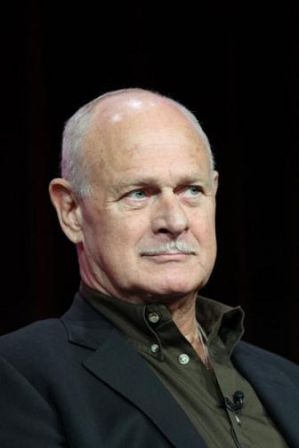
Gerald McRaney
And there was no better person to put it all in perspective than Major Dad himself (Detective Hicks, ret.) when he said to Cooper, “One day you wake up and realize you’re the last of the Mohicans around. New kids and new ways of doing things makes you about as useless as t**s on a bowling ball.”
“What do you do then?” Cooper asked.
“You buy yourself a used hole in the water (referring to his boat, where they stood near a gaggle of other gray-haired retired cops),” said Hicks, “and kick back and enjoy.”
Well, I’ve been “kicked back” and so-called “enjoying” for several years now, and I can assure you that not a single day passes without my mind drifting back to the job. And I doubt that Cooper is the type to forget. I know McRaney is not someone to kick back either, since he still serves in the reserves. As they say, once it’s in your blood…
You know, this show is packed so full, especially for a one-hour episode, that there’s no way to cover it all. So I’ll close by saying again that SouthLAnd is hands-down the best cop show on TV today. And that brings me to the premiere of Boston’s Finest that aired last night.
Many of you have asked me to write reviews of that show too. Well, I watched part of it last night, and, having lived in Boston for a few years, it held my interest merely because of the scenery. Boston is a cool city, and the police officers there are top-notch. But it’s just not my thing to watch an officer having breakfast with her crackhead sister, visiting family members, and doing other mundane tasks between scenes showing police responding to calls. For some reason, images of Honey Boo-Boo’s mom and the Gator Boys flashed before my eyes during these scenes. Sure, some of the calls were interesting and exciting, but overall this was a yawner for me. I’ll try to watch again next week, so we’ll see how it goes at that time.
In the meantime…”Light ’em up,” Southland!
*Babel – a scene of confusion, noise, and sounds…
 @cuffmecuslitz – LeeLofland kudos to you. Your words made my eyes well with tears. Well done!
@cuffmecuslitz – LeeLofland kudos to you. Your words made my eyes well with tears. Well done!
